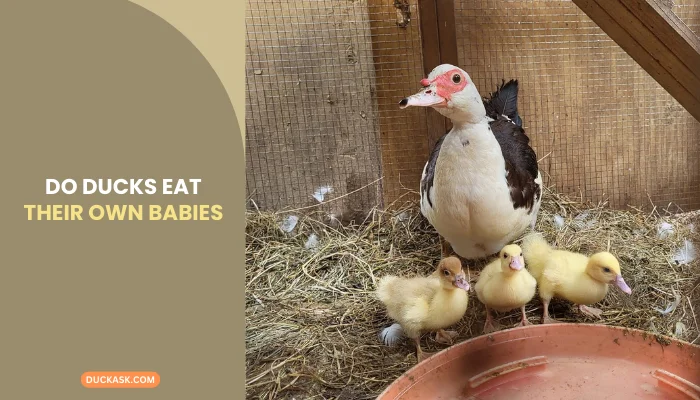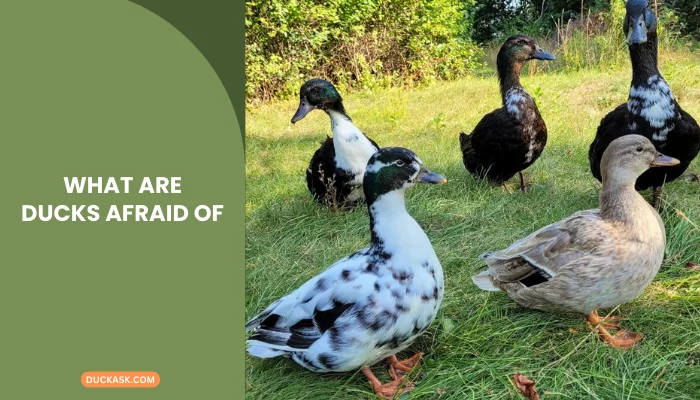What Time Do Ducks Wake Up? Sleeping Schedule
If you’re a duck observer, I’m sure most of the time, you notice the ducks to be awake much before the day even starts. Did it ever make you wonder what time do ducks wake up in the morning and whether they even sleep at night?
Well, the fact is they wake up much early in the dawn, just before or around sunrise. And that is why we always see them awake when we wake up. This nature of them to get awake in the dawn is referred to as crepuscular.
But that doesn’t mean it will always be the case for all kinds of ducks. There are several factors influencing their waking schedule. Let’s dive into the details.
Looking for more articles about duck habits:
What Time Do Ducks Normally Wake Up?
If you follow the lifestyle of a duck, you’ll realize they get calm during the nighttime and they’re fully awake from the very morning, much before you wake up. This might make you wonder sometimes, do ducks have a specific time they wake up?
Well, most ducks are crepuscular in nature. This is why they prefer waking up early at dawn.
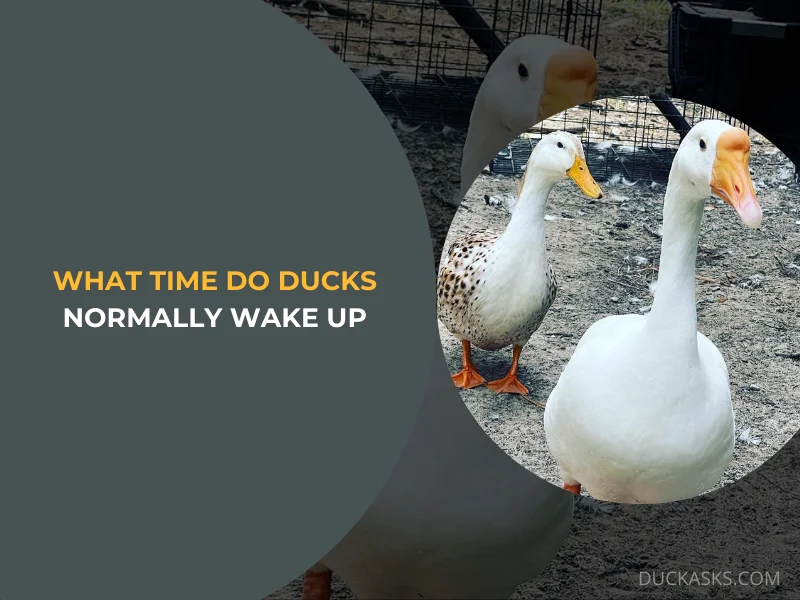
They start to quack just a few minutes before the sun rises and start to prepare for the day. And so, you’ll always find them awake before you are. Such ducks are usually less active at night.
However, even though most ducks wake up during the dawn, a few species of ducks, like mallards and wood ducks are nocturnal in nature.
They are less active during the day and stay awake the entire night. These species of ducks tend to wake up during the afternoon or evening.
Factors that Influence the Waking Hour of Ducks
We have already mentioned that the waking times of ducks are different for different species. But that’s not the only factor influencing the time ducks choose to wake up.
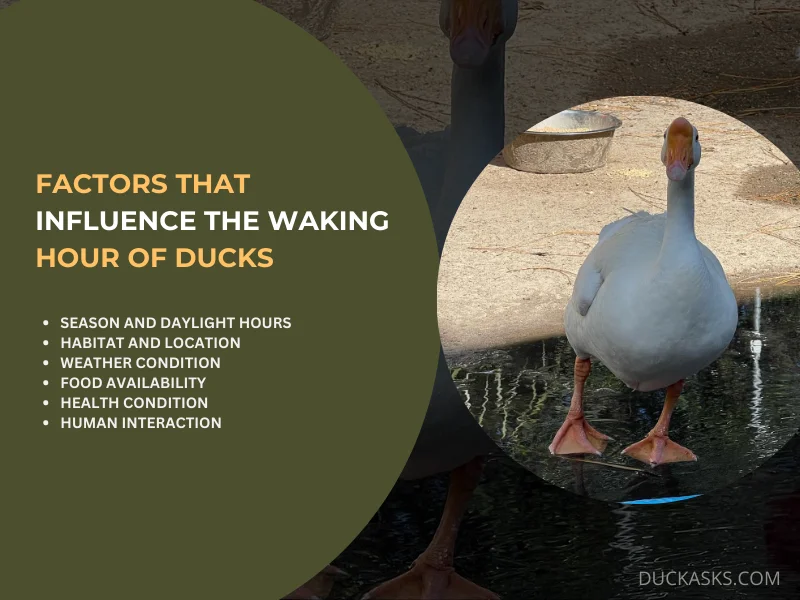
There are several other factors as well that change the waking time of a duck. Below I have discussed a few significant ones.
Season and Daylight Hours
Ducks waking time depends highly on the timing of the daylight. In summer, when the day is longer, the ducks usually wake up much earlier to utilize the extended daylight.
On the other hand, they prefer to wake up a little late in winter to avoid encountering cold weather.
Habitat and Location
The location and habitat of the ducks have a major influence on altering their waking time.
Ducks living in urban areas, with more availability of artificial lights, might adapt to a different biological clock than that of the ducks from rural areas with more natural light.
Weather Condition
Do you ever feel like sleeping till a little late in the morning when it’s raining outside? The ducks feel the same. In rainy and cold weather, ducks wake up a little late to avoid unfavorable weather conditions.
Food Availability
The most crucial part of ducks’ waking up routine is foraging for food. Hence, the availability of food impacts a lot in their preferred time to wake up.
If there isn’t much food available during the day, they might wake up a little late to get access to more food.
Health Condition
Just like any other living beings, ducks’ health condition affects when they wake up. Ducks that are sick or weak might wake up later or have much lesser activity than other ducks.
Human Interaction
Domesticated ducks are dependent on their interaction with humans or caretakers. Their biological clock adapts with the time their fed and released from captivity by the caretakers.
What Is a Duck’s Daily Routine?
A duck’s daily routine is almost as variable as humans. It changes and varies depending on several factors. Such as their species, the environment, weather, season, and individual characteristics and preferences.
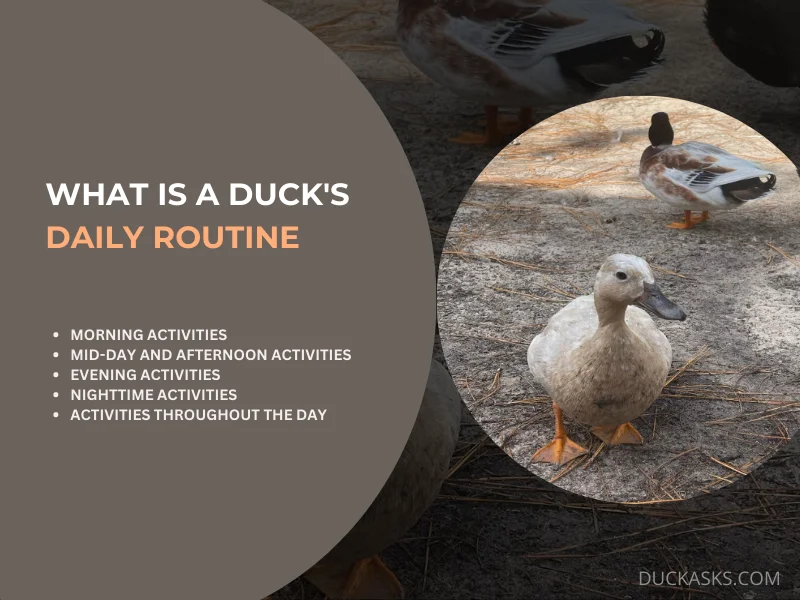
However, in general, a duck’s daily routine can be outlined in the following way.
Morning Activities
Waking Up: Ducks are crepuscular, which means they are very active during the early morning hours and the dawn. During that time, they wake up, stretch, and preen their feathers to freshen up.
Feeding: Feeding is the most important part of their morning routines. After an entire night of resting, ducks go on the search for food in the morning to arrange their breakfast.
Mid-Day and Afternoon Activities
Resting: During midday, after they’re done with their morning routine, they usually step back from their duties and take a break. At this hour, the ducks tend to rest and enjoy their day near the water or the shore.
Grooming: They also involve in grooming themselves during this time by aligning their bills and oiling their feathers. This helps them to gain better insulation and buoyancy to swim through the ponds.
Evening Activities
Foraging: As dusk comes near and the light starts to fade, the ducks become active again. They start looking for food for their dinner and prepare for the rest of the night.
Nighttime Activities
Rest and Roosting: As the darkness sets in, ducks take shelter for resting and roosting. Also, they take precautions to protect themselves from nocturnal predators.
Activities Throughout the Day
Social Interaction: Ducks are social in nature. And so, their interaction with other ducks throughout the day is an integral part of their daily routine. These interactions include courtship display, mating behavior, or simply spending time with fellow ducks in the flock.
Vigilance and Safety: To ducks, their safety and security are always important regardless of the time of the day. Hence, their always alert to potential threats, both on land and water.
What Time Do Ducks Typically Go to Bed?
Well, just like ducks’ waking time depends on various factors we mentioned, their resting and roosting time depends on most of those factors as well.
However, naturally, ducks that are crepuscular go to sleep just a few hours after dusk, when it all gets dark and silent.
And factors like season, location, weather, food availability, species, and health condition always influence their schedule.

For example, when the ducks fail to collect enough food to cover the night during the daytime, they might delay their sleeping schedule a bit for foraging.
Apart from these obvious reasons, there can be a few extra reasons for them to delay their resting time. Such as, having threats of nocturnal predators keep them awake and alert unless they find a secure location.
Moreover, ducks that are domesticated have sleeping patterns influenced by the routine established by their caretakers. The availability of artificial light plays a significant role in their sleeping schedule.
How Long Do Ducks Typically Stay Awake During the Day?
Because of the crepuscular nature of most ducks, they are most active and awake during dawn, early morning, and late afternoon. Their nature and timing depend on all the factors we discussed a while ago.
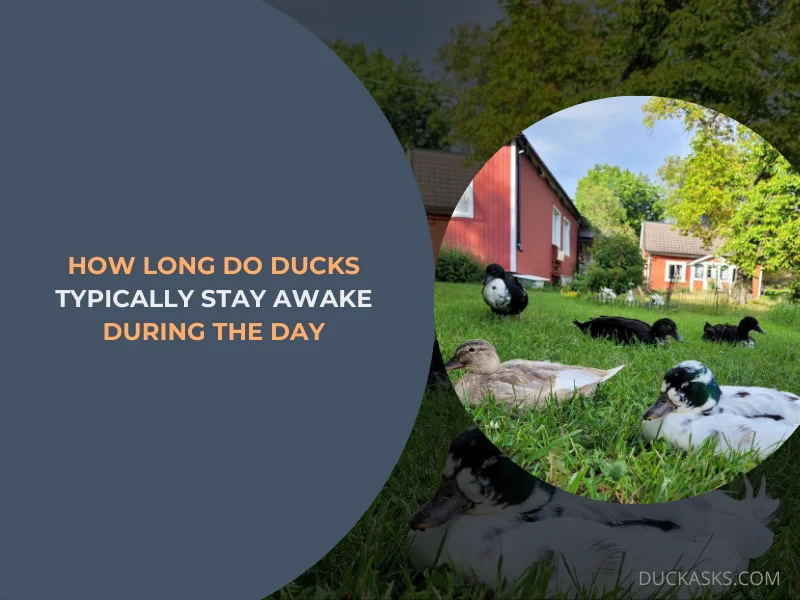
It’s different for different species and habitats. On average, a duck can stay awake for approximately 10 to 12 hours a day. But the availability of light might change this frame.
However, during the mid-day, the ducks’ activity reduces a bit as they opt for resting or just simply chilling out on water or land. A few lazy ducks might even take a quick nap in those hours.
Do the Social Life of Ducks Affect When They Wake Up?
As we already told you, ducks are very social. Some of their behavior makes them even more social than humans. Such as ducks have this nature of communal waking where all the ducks in a flock wake up together in a synchronized way.
This is a behavior they adopted to enhance their safety as a group. Moreover, it helps them forage faster and more efficiently. Foraging together at a time helps them cover more areas and access more food. It also keeps one duck aware of the other in danger.
Conclusion
Now that you know what time do ducks wake up, you’re one step closer to knowing the lifestyle of this fascinating creature. Since their waking and sleeping schedule influences most of their daily activities and overall behavior.
I’m sure you’re excited to share this knowledge with your other duck-loving friends.
So, what are you waiting for? Go ahead and share away this article with your friends on Facebook, Twitter, and Pinterest.
Image Credits:
- Facebook.com/Marie Smith
- Instagram/ericas_ducks

